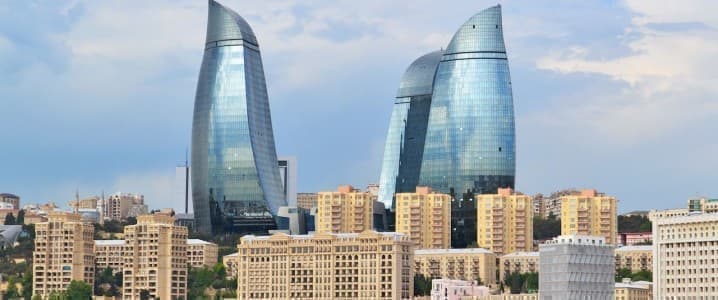The Russia-Ukraine war disrupted global supply chains and weakened economies worldwide, but it spells opportunity for Azerbaijan, the hinge of Europe and Asia. The U.S. and Europe sanctioned Russian oil and natural gas, but Azerbaijan is on track to increase gas exports in 2022 and the following years, via the 3,500-kilometer Southern Gas Corridor (SBC) which traverses seven countries and supplies Turkey and Europe. Currently, Azerbaijan supplies 10 billion cubic meters (bcm) of natural gas to Europe and 6bcm to Turkey through the SGC.
To meet demand, Azerbaijan will also put two new gas fields in operation, and is open to investment to expand the capacity of the SGC, for example by installing additional compressor stations that can double the flow of gas. But Azerbaijan's economy minister says European “underinvestment” may slow the country’s ability to supply more gas.
This week, Azerbaijan’s energy minister told the World Utilities Congress in Abu Dhabi, “We are now working very intensively with the European Commission...we are working on the ways, in a relatively short period of time, to upgrade this infrastructure and subsequently increase our energy supply to Europe in terms of natural gas.”
Azerbaijan’s Baku-Tbilisi-Supsa oil pipeline on the Black Sea has been temporarily shut down (until the end of June) and product rerouted to the Baku-Tbilisi-Ceyhan pipeline on Turkey’s Mediterranean coast. The redirection of the oil to Ceyhan will also bolster the position of Turkey as it also hosts the middle leg of the SGC, the Trans-Anatolian Natural Gas Pipeline.
Ground transport is being reorganized to avoid Russia and Western sanctions.
Related: Putin: Russia Won't Shut Down Oil Wells
The East-West rail line from China to Turkey, the Trans-Caspian International Transport Route, also known as the “Middle Corridor,” circumvents Russia, and connects Xi’an, China with Istanbul via a rail link through Kazakhstan, a hop to Azerbaijan across the Caspian Sea, and an onward rail link through Georgia to Turkey.
The route, which hasn’t yet lived up to its potential, may finally get a chance to flex as shipping through Central Asia and the Caucasus will grow six times in 2022 compared to 2021. In April, shipping company Maersk announced revamped rail service “in response to customers’ ever-changing supply chain needs in the current extraordinary times,” and commissioned the new service with a 13 April train from Xi’an to Germany.
Other regional shipping options are West from Afghanistan to Turkey via Turkmenistan, Azerbaijan, and Georgia via the “Lapis Lazuli Corridor,” and from Azerbaijan West to Turkey via the Zangezur corridor through Armenia, though the ongoing dispute between Azerbaijan and Armenia may cause a lengthy delay in realizing that route.
Estate agents say, it's always “location, location, and location.” Will Baku be able to capitalize on its utility for sending cargo and energy West to secure a final settlement of the conflict in Nagorno-Karabakh?
After the end of the 2020 Nagorno-Karabakh war, Azeri president Ilham Aliyev met the co-chairs of the Organization for Security and Co-operation in Europe (OSCE) Mink Group and told them, “Azerbaijan resolved the conflict which lasted for almost thirty years” and “Unfortunately [the] Minsk Group didn’t play any role in resolution of the conflict.”
In January 2022, Aliyev said the Minsk Group should play no further role in the resolution of the Nagorno-Karabakh matter because “it is resolved.” Aliyev may feel that way because, as reported by Rasmus Canbäck, the OSCE failed to prioritize the resources necessary to produce a peace agreement between Azerbaijan and Armenia and the priority was “the maintenance of a functioning armistice.”
While many of the Minsk Group members - France, the Russian Federation, the United States, Belarus, Finland, Germany, Italy, Sweden, Turkey as well as Armenia and Azerbaijan – may be in no rush - it’s only been 29 years! – Azerbaijan may have another card to play as Kazakhstan has announced it will stop natural gas exports in 2023 due to increased domestic demand.
Baku can now step in and offer to help supply Europe’s energy needs and wring a multi-decade purchase agreement from the Old Country in order to secure financing to expand the SGC. Baku should press its advantage as the U.S. and Europe let the mediation process slide for almost three decades, then got distracted by the Russia-Ukraine war.
Representatives of Azerbaijan, Armenia, and Russia met in early June to discuss opening regional transportation linkages. At the same time, representatives of Azerbaijan and Armenia have been meeting in Brussels with EU and American officials who refuse to meet the Russians. This may satisfy the impulses of Brussels and Washington, but it’s also a signal to Baku (and Yerevan) that peace in Nagorno-Karabakh is still a lesser priority than the crisis du jour in Ukraine, and some of the Minsk parties may hijack the process to frustrate or isolate Russia, to finally secure the big victory over Moscow they think eluded them with the peaceful end of the Cold War in 1991.
The West’s priorities are in the numbers: Ukraine has received $54 billion in aid from the U.S., but all Azerbaijan and Armenia got were three decades of meetings.
Azerbaijan doesn’t want antagonistic or feudatory relationships with its neighbors, Russia and Iran, and won’t be a platform for NATO action against Russia, or an Israeli strike on Iran’s nuclear program. Baku sent humanitarian aid to Ukraine, but hasn’t openly criticized Russia, no doubt to the anger of Washington and Brussels. Azerbaijan can be a reliable source of energy and transport for Europe but will have to take account of its strong neighbors, and so won’t always join the amen chorus in Brussels and Washington, D.C., especially as the two capitals have never prioritized peace in the South Caucasus, and are allies of convenience, not conviction.
By James Durso for Oilprice.com
More Top Reads From Oilprice.com:
- Natural Gas Prices Tank Again As Freeport LNG Remains Shut For Almost A Month
- Noway's Offshore Oil Workers Threaten To Strike
- More Iranian Crude May Be Coming To World Markets


















